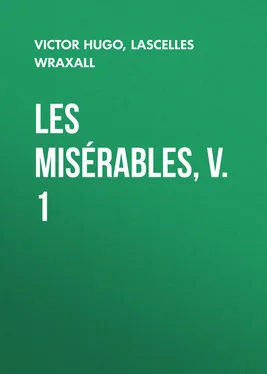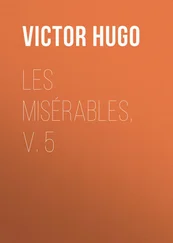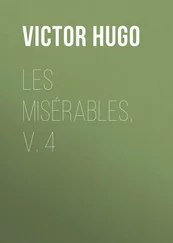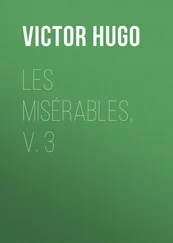Lascelles Wraxall - Les Misérables, v. 1
Здесь есть возможность читать онлайн «Lascelles Wraxall - Les Misérables, v. 1» — ознакомительный отрывок электронной книги совершенно бесплатно, а после прочтения отрывка купить полную версию. В некоторых случаях можно слушать аудио, скачать через торрент в формате fb2 и присутствует краткое содержание. Жанр: literature_19, foreign_antique, foreign_prose, на английском языке. Описание произведения, (предисловие) а так же отзывы посетителей доступны на портале библиотеки ЛибКат.
- Название:Les Misérables, v. 1
- Автор:
- Жанр:
- Год:неизвестен
- ISBN:нет данных
- Рейтинг книги:4 / 5. Голосов: 1
-
Избранное:Добавить в избранное
- Отзывы:
-
Ваша оценка:
- 80
- 1
- 2
- 3
- 4
- 5
Les Misérables, v. 1: краткое содержание, описание и аннотация
Предлагаем к чтению аннотацию, описание, краткое содержание или предисловие (зависит от того, что написал сам автор книги «Les Misérables, v. 1»). Если вы не нашли необходимую информацию о книге — напишите в комментариях, мы постараемся отыскать её.
Les Misérables, v. 1 — читать онлайн ознакомительный отрывок
Ниже представлен текст книги, разбитый по страницам. Система сохранения места последней прочитанной страницы, позволяет с удобством читать онлайн бесплатно книгу «Les Misérables, v. 1», без необходимости каждый раз заново искать на чём Вы остановились. Поставьте закладку, и сможете в любой момент перейти на страницу, на которой закончили чтение.
Интервал:
Закладка:
The Bishop took his stick, put on his overcoat to hide his well-worn cassock, as well as to protect him against the night breeze which would soon rise, and set out. The sun had almost attained the horizon when the Bishop reached the excommunicated spot. He perceived with a certain heart-beating that he was close to the wild beast's den. He strode across a ditch, clambered over a hedge, entered a neglected garden, and suddenly perceived the cavern behind some shrubs. It was a low, poor-looking hut, small and clean, with a vine nailed over the front.
In front of the door an old white-haired man, seated in a worn-out wheel-chair, was smiling in the sun. By his side stood a boy, who handed him a pot of milk. While the Bishop was looking at him the old man uplifted his voice. "Thanks," he said, "I want nothing further," and his smile was turned from the sun to rest on the boy.
The Bishop stepped forward, and at the noise of his footsteps the seated man turned his head, and his face expressed all the surprise it is possible to feel after a long life.
"Since I have lived here," he said, "you are the first person who has come to me. Who may you be, sir?"
The Bishop answered, "My name is Bienvenu Myriel."
"I have heard that name uttered. Are you not he whom the peasants call Monseigneur Welcome?"
"I am."
The old man continued, with a half-smile, "In that case you are my Bishop?"
"A little."
"Come in, sir."
The conventionalist offered his hand to the Bishop, but the Bishop did not take it – he confined himself to saying, —
"I am pleased to see that I was deceived. You certainly do not look ill."
"I am about to be cured, sir," the old man said; then after a pause he added, "I shall be dead in three hours. I am a bit of a physician, and know in what way the last hour comes. Yesterday only my feet were cold; to-day the chill reached my knees; now I can feel it ascending to my waist, and when it reaches the heart I shall stop. The sun is glorious, is it not? I had myself wheeled out in order to take a farewell glance at things. You can talk to me, for it does not weary me. You have done well to come and look at a dying man, for it is proper that there should be witnesses. People have their fancies, and I should have liked to go on till dawn. But I know that I can hardly last three hours. It will be night, but, after all, what matter? Finishing is a simple affair, and daylight is not necessary for it. Be it so, I will die by star-light."
Then he turned to the lad:
"Go to bed. You sat up the other night, and must be tired."
The boy went into the cabin; the old man looked after him, and added, as if speaking to himself, —
"While he is sleeping I shall die; the two slumbers can keep each other company."
The Bishop was not so moved as we might imagine he would be. He did not think that he saw God in this way of dying: and – let us out with it, as the small contradictions of great hearts must also be indicated – he, who at times laughed so heartily at his grandeur, was somewhat annoyed at not being called Monseigneur, and was almost tempted to reply, Citizen. He felt an inclination for coarse familiarity, common enough with doctors and priests, but to which he was not accustomed. This man after all, this conventionalist, this representative of the people, had been a mighty one of the earth: for the first time in his life, perhaps, the Bishop felt disposed to sternness.
The Republican, in the mean while, regarded him with modest cordiality, in which, perhaps, could be traced that humility which is so becoming in a man who is on the point of returning to the dust. The Bishop, on his side, though he generally guarded against curiosity, which according to him was akin to insult, could not refrain from examining the conventionalist with an attention which, as it did not emanate from sympathy, would have pricked his conscience in the case of any other man. The conventionalist produced the effect upon him of being beyond the pale of the law, even the law of charity.
G – , calm, almost upright, and possessing a sonorous voice, was one of those grand octogenarians who are the amazement of the physiologist. The Revolution possessed many such men, proportioned to the age. The thoroughly tried man could be seen in him, and, though so near his end, he had retained all the signs of health. There was something which would disconcert death in his bright glance, his firm accent, and the robust movement of his shoulders: Azrael, the Mohammedan angel of the tomb, would have turned back fancying that he had mistaken the door. G – seemed to be dying because he wished to do so; there was liberty in his agony, and his legs alone, by which the shadows clutched him, were motionless. While the feet were dead and cold, the head lived with all the power of life and appeared in full light. G – at this awful moment resembled the king in the Oriental legend, flesh above and marble below. The Bishop sat down on a stone and began rather abruptly: —
"I congratulate you," he said, in the tone people employ to reprimand; " at least you did not vote the King's death."
The Republican did not seem to notice the covert bitterness of this remark, at least ; he replied, without a smile on his face, —
"Do not congratulate me, sir: I voted the death of the tyrant." It was the accent of austerity opposed to that of sternness.
"What do you mean?" the Bishop continued.
"I mean that man has a tyrant, Ignorance, and I voted for the end of that tyrant which engendered royalty, which is the false authority, while knowledge is the true authority. Man must only be governed by knowledge."
"And by his conscience," the Bishop added.
"That is the same thing. Conscience is the amount of innate knowledge we have in us."
Monseigneur Welcome listened in some surprise to this language, which was very novel to him. The Republican continued, —
"As for Louis XVI. I said No. I do not believe that I have the right to kill a man, but I feel the duty of exterminating a tyrant, and I voted for the end of the tyrant. That is to say, for the end of prostitution for women; the end of slavery for men; and the end of night for children. In voting for the Republic I voted for all this: I voted for fraternity, concord, the Dawn! I aided in the overthrow of errors and prejudices, and such an overthrow produces light; we hurled down the old world, and that vase of wretchedness, by being poured over the human race, became an urn of joy."
"Mingled joy," said the Bishop.
"You might call it a troubled joy, and now, after that fatal return of the past which is called 1814, a departed joy. Alas! the work was incomplete, I grant; we demolished the ancient régime in facts, but were not able to suppress it completely in ideas. It is not sufficient to destroy abuses, but morals must also be modified. Though the mill no longer exists, the wind still blows."
"You demolished: it may be useful, but I distrust a demolition complicated with passion."
"Right has its passion, Sir Bishop, and that passion is an element of progress. No matter what may be said, the French Revolution is the most powerful step taken by the human race since the advent of Christ. It may be incomplete, but it was sublime. It softened minds, it calmed, appeased, and enlightened, and it spread civilization over the world. The French Revolution was good, for it was the consecration of humanity."
The Bishop could not refrain from muttering, – "Yes? '93!"
The Republican drew himself up with almost mournful solemnity, and shouted, as well as a dying man could shout, —
"Ah! there we have it! I have been waiting for that. A cloud had been collecting for fifteen hundred years, and at the end of that period it burst: you are condemning the thunder-clap."
Читать дальшеИнтервал:
Закладка:
Похожие книги на «Les Misérables, v. 1»
Представляем Вашему вниманию похожие книги на «Les Misérables, v. 1» списком для выбора. Мы отобрали схожую по названию и смыслу литературу в надежде предоставить читателям больше вариантов отыскать новые, интересные, ещё непрочитанные произведения.
Обсуждение, отзывы о книге «Les Misérables, v. 1» и просто собственные мнения читателей. Оставьте ваши комментарии, напишите, что Вы думаете о произведении, его смысле или главных героях. Укажите что конкретно понравилось, а что нет, и почему Вы так считаете.












